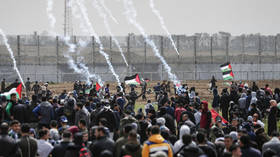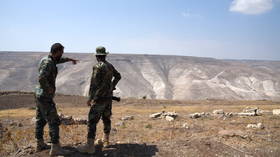Libyan factions clash ahead of UN-backed peace talks, 8 years after NATO regime change
The feeble government in Tripoli is losing ground to General Khalifa Haftar’s forces ahead of yet another round of UN-backed talks, eight years after NATO’s “humanitarian” intervention plunged the North African country into chaos.
Haftar’s Libyan National Army (LNA) moved west and engaged “illegal” armed groups, LNA spokesman Ahmed Mismari told al-Arabiya TV on Wednesday. They clashed with forces loyal to Prime Minister Fayez al-Sarraj, south of Tripoli.
“We expect the women of Tripoli to welcome the Libyan army like the women of Benghazi and Derna did,” Mismari said, according to Reuters. The LNA took Benghazi in 2017, and liberated Derna from militants last summer.
In response, al-Sarraj has ordered a mobilization of forces loyal to his government to “confront any threats aiming at disturbing the peace in any part of the country.”
I have just arrived in Libya, totally committed to support a Libyan-led political process leading to peace, stability, democracy and prosperity for the Libyan people.
— António Guterres (@antonioguterres) April 3, 2019
Oil-rich Libya once had the highest Human Development Index in the whole of Africa. In March 2011, however, NATO began bombing the country in support of Islamist rebels, who were fighting against the government of Colonel Muammar Gaddafi.
After Gaddafi was brutally murdered in October 2011, Libya descended into chaos and civil war, featuring open-air slave markets trafficking migrants from sub-saharan Africa and the surge of terrorism, including the Islamic State (IS, formerly ISIS/ISIL).
Also on rt.com Libya: New Gaddafi figure waits in the wings but says he has 'no time for democracy'Libya was eventually divided between rival governments in Tripoli and Tobruk, with wide stretches of desert in the south controlled by nomadic tribes and used as conduits for human traffickers. Haftar’s LNA, which arose in 2014, gradually expanded its influence from Tobruk to Benghazi and beyond. It currently controls over 70 percent of the country, compared to less than seven percent under control of Tripoli.
👇Here is one more map on who controls what in Libya by the end of March, 2019.↗️Libyan National Army - 1,256,987 km2 - approx. 77,5%↘️Government of National Accord - 105,894 km2 - approx. 6,5%Areas near the southern border (marked by blue marine) are in control of Tubou pic.twitter.com/jowq2J7k7D
— SMM Libya (@smmlibya) April 1, 2019
Haftar’s troops launched an operation to “cleanse” southern Libya of terrorists in January, gaining control over major oil fields. Their operation in western Libya appears to be aimed at solidifying control and gaining the upper hand in the upcoming UN-sponsored talks, scheduled for mid-April.
UN Secretary General Antonio Guterres is currently visiting Tripoli as part of preparations for the conference, which seeks to negotiate a power-sharing settlement between Haftar’s forces and al-Sarraj’s government, which is being propped up by a patchwork of militias.
Think your friends would be interested? Share this story!














